#best line I have written
Text


#lupineleigh’s thoughts#adhd autism solidarity#depression or just dopamine withdrawal?#my brain is a fickle little cat snubbing gourmet dinners#best line I have written#actually neurodivergent#hidden disability#reading#dyslexia#hyper focus versus hyper fixation#self identify#apathy#mental health#I could copy and paste the paragraphs I wrote but I saved them on someone else’s post#I decided not to hijack their post and make my own to be considerate but the energy burned off and Imfeel#like I’m dragging myself through a quagmire right now#Brain please learn how to use dopamine.#I’m so tired
2 notes
·
View notes
Text
fionna's world being represented by a dandelion makes so much sense ... they're weeds. yet people make wishes through them, changing their whole meaning from something meant to be destroyed to something hopeful.
dandelions are also resilient and it makes sense that something associated with them would. you know. perservere despite the destruction caused by the scarab.
but ultimately i think what REALLY made me tear up over this is that dandelions are really boring plants. when you're a kid you blow on them and make your wish but they're not eyecatching or anything but still, fionna's final wish was for her old world to still exist as it was when she left it (> plain and simple. boring even).
like the moment she realized she would lose her friends, and that her friends might forget each other if the world got its magic back, she immediately decided she didn't want it and I think that ties back to the dandelion metaphor so well... like, do you really need magic to be real to find it everywhere? or can you turn something boring into something magical?
#remi rambles#fionna and cake#f&c spoilers#sorry i have many Not Silly thoughts about the finale#i looove fionna she was such a wonderful character .. so well written and real TO ME#shes my best friend shes my everything shes silly she makes me so emotional#like even when simon told her he was gonna wear the crown to get the magic back to her world#< the moment she realized he would go crazy she started to think about it#like she wont sacrifice a friend just to get what she really wants#i really loved her journey through the show idk#going from being so over her routine > finding out magic can be dark too > making her own magical world just by loving her friends#like its so much more than 'the power of friendship will save us!!'#yes she saved the world thanks to the love she had for her friends but it was backed up by a full journey beforehand#i think. the line about having functional toilets (while still being a p good joke) makes the point so much clearer#we have been to the end of the universe and back but we have functioning toilets !!!#like do u get it. do i sound crazy#< crazy person voice#anyway yes im done sorry#live laugh love fionna and cake
886 notes
·
View notes
Text
Finally done with my version of The Universe's design!

#ariart#isat#isat spoilers#the creechur... btw the stuff written on their back veil are lyrics (chaos version) to fleeting words and beautiful song#they have a mouth. but itd be best for em not to use that. i like to think that the Universe communicates via telepathy#cuz if they use their own mouth itd be like an absolute order that cant be broken (like how wishes are granted via wish craft)#the rest of their body is meant like-- a tree trunk. cuz world tree and all that! also favour tree!#hollow stomach with a single floating star aaannd the lower part of the back veil is meant to be a butterfly when whole#yes those are two faces as well. drawing the lines for that nearly made me lose my mind a lil. the angle was painful...#it aint as obvious but the stars (egg and rectangle specifically) dangling on the front veil is morse code for i love you#also in a way the reason why i decided to make their middle pair of hands in that form is that inside their palm is the country#north of vaugarde. so its like theyre holding the country protectively. a star formed to keep anyone from lookin in!
71 notes
·
View notes
Text
Eugene was truly the best boyfriend. saw his girlfriend get broken up with, and immediately had a revenge glow up. Imagine being Cassandra seeing your ex girlfriend's boyfriend and he's wearing a golden choker with the just deepest v neck known to man, the world's sluttiest gloves, and a thigh garter. I'd have to give up then and there.
#Eugenes season 3 outfit you will always be famous#eugene fitzherbert#tangled the series#:v#He saw cass's hot catsuit and knew what he had to do#Also just to scream abt the series bc I just finished#absolutely crazy to me that they have set up since s1 that Eugene has pretty strong identity issues and it's never really addressed?#like s3 was low-key a mess I wish they just let cass be a villain don't have her be manipulated the entire time let her choose it at least#or like I'm fine with her being manipulated but I just felt like they didn't want to go to far with her character#and it made her feel kinda weak narratively#a lot just felt rushed#and I think we should have gotten a biiit more with eugenes identity issues#bc a lot of it in that episode was just a running joke#will say.#euegene/Rapunzel really carried that series they're relationship was the best written part#I would like cass more if they let her be a bit more unhinged#Her best moment was ''will you fight for him?''#Like yess queen expand on that more#Need a whole episode of her kidnapping Eugene to fuck with Rapunzel#Also sorry you were worth fighting for is downright one of the most romantic lines in the whole show#Also it's so funny to me bc Rapunzel is so protective over Eugene like cass touches him and she's just#SHES MIIINE GET AWAY FROM HER IT'S NOT HER TIIIIME
84 notes
·
View notes
Text
First Letter from Julia I. Sand to Chester A. Arthur
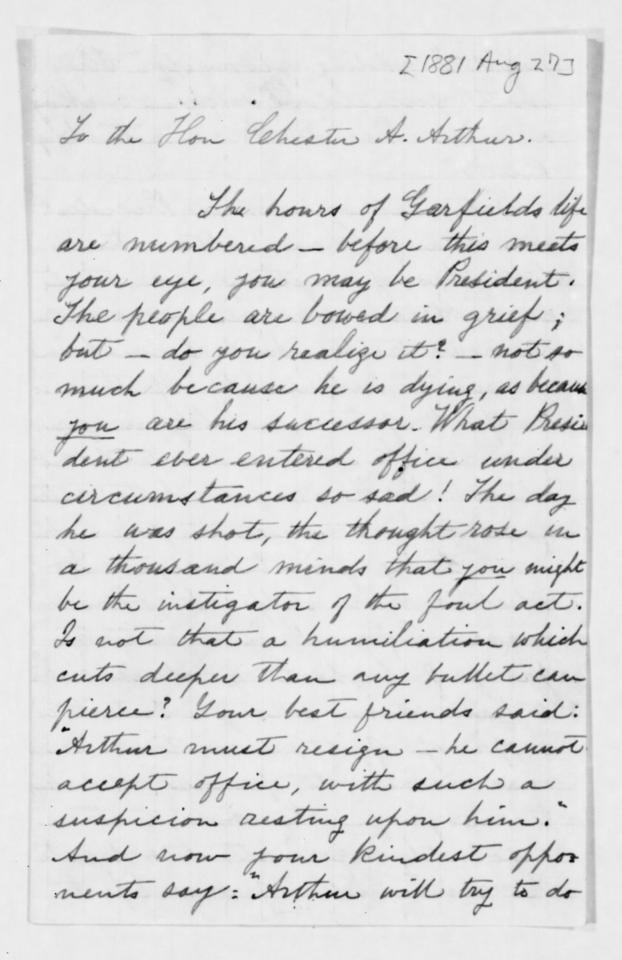
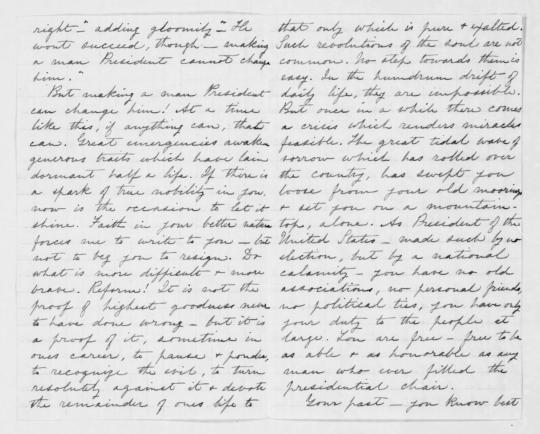
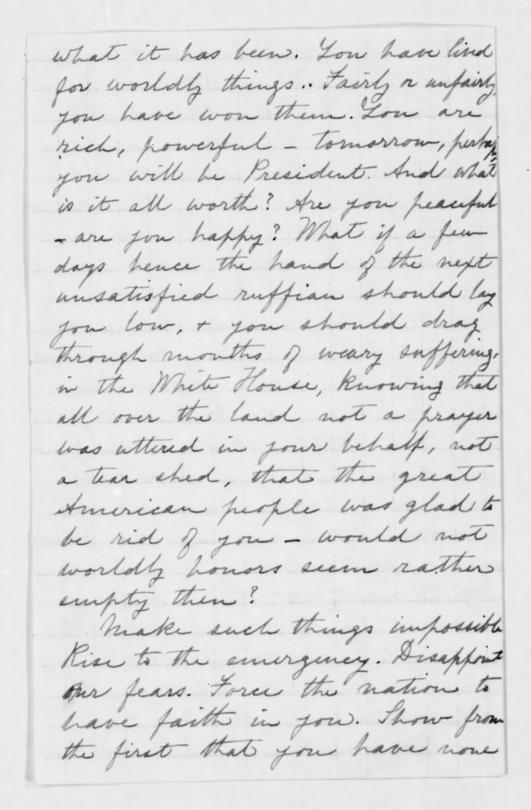
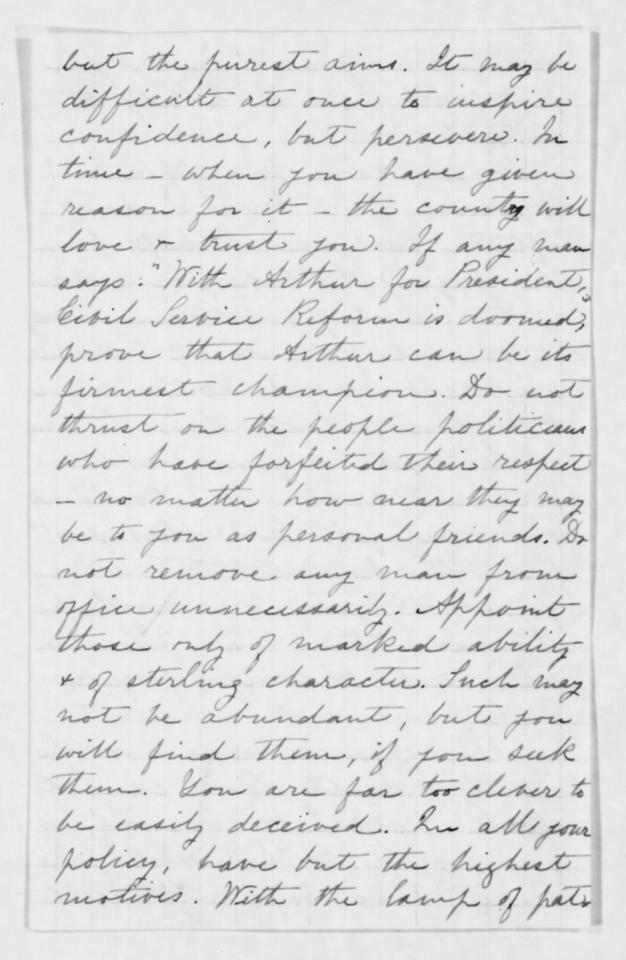

[1881 Aug 27]
To the Hon Chester A. Arthur.
The hours of Garfield's life are numbered--before this meets your eye, you may be President. The people are bowed in grief; but--do you realize it?--not so much because he is dying, as because you are his successor. What President ever entered office under circumstances so sad! The day he was shot, the thought rose in a thousand minds that you might be the instigator of the foul act. Is not that a humiliation which cuts deeper than any bullet can pierce? Your best friends said: "Arthur must resign--he cannot accept office, with such a suspicion resting upon him." And now your kindest opponents say: "Arthur will try to do right"--adding gloomily--"He won't succeed, though--making a man President cannot change him."
But making a man President can change him! At a time like this, if anything can, that can. Great emergencies awaken generous traits which have lain dormant half a life. If there is a spark of true nobility in you, now is the occasion to let it shine. Faith in your better nature forces me to write to you--but not to beg you to resign. Do what is more difficult and more brave. Reform! It is not the proof of highest goodness never to have done wrong--but it is a proof of it, sometime in one's career, to pause and ponder, to recognize the evil, to turn resolutely against it and devote the remainder of ones life to that only which is pure and exalted. Such revolutions of the soul are not common. No step towards them is easy. In the humdrum drift of daily life, they are impossible. But once in a while there comes a crisis which renders miracles feasible. The great tidal wave of sorrow which has rolled over the country, has swept you loose from your old moorings and set you on a mountain-top, alone. As President of the United States--made such by no election, but by a national calamity--you have no old associations, no personal friends, no political ties, you have only your duty to the people at large. You are free--free to be as able and as honorable as any man who ever filled the presidential chair.
Your past--you know best what it has been. You have lived for worldly things. Fairly or unfairly, you have won them. You are rich, powerful--tomorrow, perhaps, you will be President. And what is it all worth? Are you peaceful--are you happy? What if a few days hence the hand of the next unsatisfied ruffian should lay you low, and you should drag through months of weary suffering, in the White House, knowing that all over the land not a prayer was uttered in your behalf, not a tear shed, that the great American people was glad to be rid of you--would not worldly honors seem rather empty then?
Make such things impossible. Rise to the emergency. Disappoint our fears. Force the nation to have faith in you. Show from the first that you have none but the purest aims. It may be difficult at once to inspire confidence, but persevere. In time--when you have given reason for it--the country will love and trust you. If any man says, "With Arthur for President, Civil Service Reform is doomed," prove that Arthur can be its firmest champion. Do not thrust on the people politicians who have forfeited their respect--no matter how near they may be to you as personal friends. Do not remove any man from office unnecessarily. Appoint those only of marked ability and of sterling character. Such may not be abundant, but you will find them, if you seek them. You are far too clever to be easily deceived. In all your policy, have none but the highest motives. With the lamp of patriotism in your hand, your feet will not be likely to stumble.
Do you care for applause? Of course, you have had it, after a fashion. Perhaps from the dregs of the populace, inspired by the lowest of politicians. Possibly it pleased you at the time--it may have served some purpose that you solved then. But in the depths of your soul, do you not despise it? Would not one heart-felt "God bless you!" from the honest and true among your countrymen, be worth ten thousand times more? You can win such blessing, if you will.
Your name now is on the annals of history. You cannot slink back into obscurity, if you would. A hundred years hence, school boys will recite your name in the list of Presidents and tell of your administration. And what shall posterity say? It is for you to choose whether your record shall be written in black or in gold. For the sake of your country, for your own sake and for the sakes of all who have ever loved you, let it be pure and bright.
As one of the people over whom you are to be President, I make you this appeal. Perhaps you have received many similar. If not, still believe that this expresses the thoughts in many hearts, today--and do not give those who have had faith in you, cause for regret.
Yours Respectfully,
Julia I. Sand.
46 E. 74th st. New York.
Aug 27th 1881.
#history is awesome#presidential talk#last week if you'd known me in real life there's a 50% chance i'd have tackled you and forced you to read this#isn't this letter just astounding?#imagine sending this to a soon-to-be president!#and him *saving* it!#there are such lovely turns of phrase#even while she is *so* brutal and unflinching#my favorite line might be 'you are far too clever to be easily deceived'#just appealing straight to his vanity#brilliant!#i haven't loved a letter this much since 84 charing cross road#the moral of the story is that the best letters are written by slightly cracked politically-minded literary spinsters
191 notes
·
View notes
Text
Valentines, huh..(pretend I'm posting this on the 14th)




Only four signature villains, sorry 💔but hey everyone loves them right
#courage the cowardly dog#ctcd#katz#le quack#black puddle queen#queen of the black puddle#cajun fox#valentines day#geldraws#geldoodles#I tried my best at creating a line for the four of them lol#horrendous handwriting but it's more better than using a digital-written text#feel free to use however you like#you don't even have to give credits because I didn't even watermark these#would be preferred and appreciated if you did tho#tw spiders
42 notes
·
View notes
Text

wait why would they cut this
#I do think these lines could’ve been written better but#maybe if they left this in I wouldn’t have to see people comparing sam to sidney all the time#and I wouldn’t have to see people bashing sam and calling her a cheap sidney knockoff/replacement#why do they always cut some of the best moments#like yeah in hindsight it seems minor to the overall plot but it’s important for the characters#sigh#sam carpenter#gale weathers#scream
48 notes
·
View notes
Text
15 Lines of Dialogue
Rules: Share 15 or fewer lines of dialogue from an OC, ideally lines that capture their character/personality/vibe. Bonus points for just using the dialogue without other details about the scene, but you’re free to include those as well.
holey moley thank you for the tag @meltypancake !! I'll use Theo here too, he is my cute lab rat

Academy phase
★ "Uh, no, I'm not interested in your house right now. BUT.. maybe.. if you add a little something.. maybe then I'll change my mind."
[Theo really values the following stats:
50k gold
Try recruiting this unit after you gain more experience]
★ "Ye, I'm totally a noble. I'm so noble. I love.. tea and.. and.. and spending money.. and.. Listen, just trust me on this one, ok?"
★ "Viscount Menja is a good father. He sends me letters every month! And allowance! What more can I ask for?"
★ "Oh, no, that's not- WAIT, no, that's.. that's totally totally mine, yep. No, no, don't go!" - when receiving not his lost item
★ "Your life is worthless!" - crit line
★ "...Oh, am I supposed to say something?" - first(?) kill on Ch. 3
★ " 'ight, I'll tell you as much: I'm not a noble! I actually was a merc. I saved that.. that.. Theodore. I saved him from some bandits, out of goodness of my heart and deep respect for nobles!! And Theodore was SO, SO impressed and touched, that he gave me his place here. And I'm not dumb, so I agreed to be.. him. He then went somewhere, I'm not sure. But I trusted him, and now.. and now, this happens.. ugh. rich bastard."
∘₊✧─────���✧₊∘₊✧──────✧₊∘₊✧──────✧₊∘
War phase
★ "Weak die."
★ "..to survive, you have to be selfish. This is what my mother taught me."
★ "You think Fodlan will open its borders some day?"
★ "Bow before Her Majesty."
★ "Mother was right. I should've given up. Maybe if I did, I wouldn't be here."
★ "It's been 10 years since I last saw my family.. 10 years and 2 months since I last saw my mother. I'm.. tired. I want to go home."
★ "Sorry, Mother.." - death quote
★ "I crawled out of that pit, just to drop on my knees in front of you, to fight for you, to just get my freedom back! (...) I did my part, and now you go back on your words because “evil basement people won’t let people live”? I don’t care about your people!"
∘₊✧──────✧₊∘₊✧──────✧₊∘₊✧──────✧₊∘
Tagging @loola-a @irpas-fe-corner and uh.. uh.. I don't know who else to tag °՞(ᗒᗣᗕ)՞° if you want to do this, feel free to!
#yully gets to yap about her ocs#i'm not a good writer but i tried.. i have some of his lines written but they're eh.. eh#i did my best#theo is my lab rat and a sobbing wet cat <3#oc: theo#fe3h oc
11 notes
·
View notes
Text
seven's the best protag ever because i could make a million "get you a man who" jokes about him. get you a man who looks at him the way thirteen does. get you a man who has undefeated whimsy and love for the world like seven. get you a man who holds his friends above everything else. get you a man who'd rather go broke and hungry rather than tear apart the bonds between people. get you a man who'd get himself killed for someone who barely knows him. get you a man who'd get himself killed for an island which he's barely familiar with. get you a man who'd dress up as you and settle the arguement between you and your girlfriend including a really long serenade. get you a man who could both save the girl in white like that and also let thirteen save him like that. get you a man who's driven purpose in life is loving others
#i think i shouldnt limit it to just “best protag” but im too lazy to think of better phrasing#i know very little medias who would be willing to write a man who's that loving and empathetic and caring and also have him have killed#literal thosuands and those two points of his characters dont contradict his very personality because his actions have genuine sensible mot#a character who is the victim of his own narrative and continues to fight it over and over and over even if he's tired#because being tired does not mean he gets to stop fighting for what he loves#the s4 op lyrics literally say something along the lines of “who's tired of fighting evil?” i cant check the netflix captions of it rn#god i just love seven as a character i love how he's written#i cannot interract with the tiktok side of the fandom because#i feel like i'm pretentous or a gatekeeper when i say this#but some people just wanna see funny badass who should be feared and will not comprehend how empathetic and adoring he is#and that's ok. that's an ok character to want and love#and i will not be the person to burst the bubble but also the bubble chokes me alive LOOK AT HIM /j#explaining the intricacies of his character takes so long and its so fun but also some mfs jsut dont wanna hear it i need mfs who need it#scissor seven#wu liuqi#seven
24 notes
·
View notes
Text
My unpopular bg3 opinion is they tried way too hard to make some of these characters mean and flippant which is meant to make the player more interested in them and clearly this has worked on many (good for you !) but personally i could not care less. If 80% of what a character has to say to me is bitchy i will simply leave them at camp for most of the game
#Is this a skill issue of mine yeah maybe. I just find it annoying#At best and off-putting at worst like is there no better way to show that shadowheart is going through stuff/have her be mean that isnt#Her getting pissy that you have respect for a bunch of dead slaves#That was wild. I didnt ask her either she just had the need to let me know she thinks these slaves aint shit bc they didnt fight back#Thanks larian!#Wild take maybe idk but i dont think that makes her interesting i think it makes her off-putting. In this case#I generally like shadowheart this just sure is a thing to have her say. And not give the player an option to respond in any way#Ill get over this single line but im mad now. This isn't the only instance of this#I guess both larian and bioware think that characters thinking slavery is kinda ok is not a deal breaker#Txt#I know that these characters soften during the game. I have played a fair amount of it. I did shadowhearts quest i know whats up. Still#In both her and astarions case i think theyre written to have some wild takes on whats Ok to do that get kinda swept under the rug#if you manage to shove them in a Good direction. But u dont. Actively see them grapple with any of it#They just suddenly go wow im better now. Yay. I suddenly dont want to enslave other people for my power (in astarions case)#Like this switch flipped bc of my one roll? Idk. Im not super convinced#I know this is how the game works. I just think it could have been written better
11 notes
·
View notes
Text
Queen Margaret (of Anjou) had written to the Common Council in November when the news of the Duke of York's coup was proclaimed. The letter from the queen was published in modernised English by M.A.E. Wood in 1846, and she dated it to February 1461 because of its opening sentence: ‘And whereas the late Duke of N [York]...." However the rest of the letter, and that of the prince, is in the present tense and clearly indicates that the Duke of York is still alive. The reference to the ‘late duke’ is not to his demise but to the attainder of 1459 when he was stripped of his titles as well as of his lands. If the queen’s letter dates to November 1460, and not February 1461, it make perfect sense. Margaret declared the Duke of York had ‘upon an untrue pretense, feigned a title to my lord’s crown’ and in so doing had broken his oath of fealty. She thanked the Londoners for their loyalty in rejecting his claim. She knew of the rumours,
that we and my lords sayd sone and owrs shuld newly drawe toward yow with an vnsome [uncounted] powere of strangars, disposed to robbe and to dispoyle yow of yowr goods and havours, we will that ye knowe for certeyne that . . . . [y]e, nor none of yow, shalbe robbed, dispoyled nor wronged by any parson that at that tyme we or owr sayd sone shalbe accompanied with
She entrusted the king's person to the care of the citizens ‘so that thrwghe malice of his sayde enemye he be no more trowbled vexed ne jeoparded.’ In other words the queen was well informed in November 1460 of the propaganda in London concerning the threat posed by a Lancastrian military challenge to the illegal Yorkist proceedings. Margaret assured the Common Council that no harm would come to the citizenry or to their property. Because the letter was initially misdated, it has been assumed that the queen wrote it after she realised the harm her marauding troops were doing to her cause, and to lull London into a false sense of security. This is not the case, and it is a typical example of historians accepting without question Margaret’s character as depicted in Yorkist propaganda. Margaret’s letter was a true statement of her intentions but it made no impact at the time and has made none since. How many people heard of it? The Yorkist council under the Earl of Warwick, in collusion with the Common Council of the city, was in an ideal position to suppress any wide dissemination of the letter, or of its content.
... When Margaret joined the Lancastrian lords it is unlikely that she had Scottish troops with her. It is possible that Jasper Tudor, Earl of Pembroke, sent men from Wales but there was no compelling reason why he should, he needed all the forces at his disposal to face Edward Earl of March, now Duke of York following his father’s death at Wakefield, who, in fact, defeated Pembroke at Mortimer’s Cross on 2 February just as the Lancastrian army was marching south. The oft repeated statement that the Lancastrian army was composed of a motley array of Scots, Welsh, other foreigners (French by implication, for it had not been forgotten that René of Anjou, Queen Margaret’s father, had served with the French forces in Nomandy when the English were expelled from the duchy, nor that King Charles VII was her uncle) as well as northern men is based on a single chronicle, the Brief Notes written mainly in Latin in the monastery of Ely, and ending in 1470. It is a compilation of gossip and rumour, some of it wildly inaccurate, but including information not found in any other contemporary source, which accounts for the credence accorded to it. The Dukes of Somerset and Exeter and the Earl of Devon brought men from the south and west. The Earl of Northumberland was not solely reliant on his northern estates; as Lord Poynings he had extensive holdings in the south. The northerners were tenants and retainers of Northumberland, Clifford, Dacre, the Westmorland Nevilles, and Fitzhugh, and accustomed to the discipline of border defence. The continuator of Gregory’s Chronicle, probably our best witness, is emphatic that the second battle of St Albans was won by the ‘howseholde men and feyd men.” Camp followers and auxiliaries of undesirables there undoubtedly were, as there are on the fringes of any army, but the motley rabble the queen is supposed to have loosed on peaceful England owes more to the imagination of Yorkist propagandists than to the actual composition of the Lancastrian army.
... Two differing accounts of the Lancastrian march on London are generally accepted. One is that a large army, moving down the Great North Road, was made up of such disparate and unruly elements that the queen and her commanders were powerless to control it.” Alternatively, Queen Margaret did not wish to curb her army, but encouraged it to ravage all lands south of the Trent, either from sheet spite or because it was the only way she could pay her troops.” Many epithets have been applied to the queen, few of them complimentary, but no one has as yet called her stupid. It would have been an act of crass stupidity wilfully to encourage her forces to loot the very land she was trying to restore to an acceptance of Lancastrian rule, with her son as heir to the throne. On reaching St Albans, so the story goes, the Lancastrian army suddenly became a disciplined force which, by a series of complicated manoeuvres, including a night march and a flank attack, won the second battle of St Albans, even though the Yorkists were commanded by the redoubtable Earl of Warwick. The explanation offered is that the rabble element, loaded down with plunder, had descended before the battle and only the household men remained. Then the rabble reappeared, and London was threatened. To avert a sack of the city the queen decided to withdraw the army, either on her own initiative or urged by the peace-loving King Henry; as it departed it pillaged the Abbey of St Albans, with the king and queen in residence, and retired north, plundering as it went. Nevertheless, it was sufficiently intact a month later to meet and nearly defeat the Yorkist forces at Towton, the bloodiest and hardest fought battle of the civil war thus far. The ‘facts’ as stated make little sense, because they are seen through the distorting glass of Yorkist propaganda.
The ravages allegedly committed by the Lancastrian army are extensively documented in the chronicles, written after the event and under a Yorkist king. They are strong on rhetoric but short on detail. The two accounts most often quoted are by the Croyland Chronicle and Abbott Whethamstede. There is no doubting the note of genuine hysterical fear in both. The inhabitants of the abbey of Crowland were thoroughly frightened by what they believed would happen as the Lancastrians swept south. ‘What do you suppose must have been our fears . . . [w]hen every day rumours of this sad nature were reaching our ears.’ Especially alarming was the threat to church property. The northern men ‘irreverently rushed, in their unbridled and frantic rage into churches . . . [a]nd most nefariously plundered them.’ If anyone resisted ‘they cruelly slaughtered them in the very churches or churchyards.’ People sought shelter for themselves and their goods in the abbey,“ but there is not a single report of refugees seeking succour in the wake of the passage of the army after their homes had been burned and their possessions stolen. The Lancastrians were looting, according to the Crowland Chronicle, on a front thirty miles wide ‘like so many locusts.“ Why, then, did they come within six miles but bypass Crowland? The account as a whole makes it obvious that it was written considerably later than the events it so graphically describes.
The claim that Stamford was subject to a sack from which it did not recover is based on the Tudor antiquary John Leland. His attribution of the damage is speculation; by the time he wrote stories of Lancastrian ravages were well established, but outside living memory. His statement was embellished by the romantic historian Francis Peck in the early eighteenth century. Peck gives a spirited account of Wakefield and the Lancastrian march, influenced by Tudor as well as Yorkist historiography.
… As late as 12 February when Warwick moved his troops to St Albans it is claimed that he did not know the whereabouts of the Lancastrians, an odd lack of military intelligence about an army that was supposed to be leaving havoc in its wake. The Lancastrians apparently swerved to the west after passing Royston which has puzzled military historians because they accept that it came down the Great North Road, but on the evidence we have it is impossible to affirm this. If it came from York via Grantham, Leicester, Market Harborough, Northampton and Stony Stratford to Dunstable, where the first engagement took place, there was no necessity to make an inexplicable swerve westwards because its line of march brought it to Dunstable and then to St Albans. The Lancastrians defeated Warwick’s army on 17 February 1461 and Warwick fled the field. In an echo of Wakefield there is a suggestion of treachery. An English Chronicle tells the story of one Thomas Lovelace, a captain of Kent in the Yorkist ranks, who also appears in Waurin. Lovelace, it is claimed, was captured at Wakefield and promised Queen Margaret that he would join Warwick and then betray and desert him, in return for his freedom.
Lt. Colonel Bume, in a rare spirit of chivalry, credits Margaret with the tactical plan that won the victory, although only because it was so unorthodox that it must have been devised by a woman. But there is no evidence that Margaret had any military flair, let alone experience. A more likely candidate is the veteran captain Andrew Trolloppe who served with Warwick when the latter was Captain of Calais, but he refused to fight under the Yorkist banner against his king at Ludford in 1459 when Warwick brought over a contingent of Calais men to defy King Henry in the field. It was Trolloppe’s ‘desertion’ at Ludford, it is claimed, that forced the Yorkists to flee. The most objective and detailed account of the battle of St Albans is by the unknown continuator of Gregory’s Chronicle. The chronicle ends in 1469 and by that time it was safe to criticise Warwick, who was then out of favour. The continuator was a London citizen who may have fought in the Yorkist ranks. He had an interest in military matters and recorded the gathering of the Lancastrian army at Hull, before Wakefield, and the detail that the troops wore the Prince of Wales’ colours and ostrich feathers on their livery together with the insignia of their lords. He had heard the rumours of a large ill-disciplined army, but because he saw only the household men he concluded that the northerners ran away before the battle. Abbot Whethamstede wrote a longer though far less circumstantial account, in which he carefully made no mention of the Earl of Warwick.
… Margaret of Anjou had won the battle but she proceeded to lose the war. London lay open to her and she made a fatal political blunder in retreating from St Albans instead of taking possession of the capital.' Although mistaken, her reasons for doing so were cogent. The focus of contemporary accounts is the threat to London from the Lancastrian army. This is repeated in all the standard histories, and even those who credit Margaret with deliberately turning away from London do so for the wrong reasons.
... The uncertainties and delays, as well as the hostility of some citizens, served to reinforce Margaret’s belief that entry to London could be dangerous. It was not what London had to fear from her but what she had to fear from London that made her hesitate. Had she made a show of riding in state into the city with her husband and son in a colourful procession she might have accomplished a Lancastrian restoration, but Margaret had never courted popularity with the Londoners, as Warwick had, and she had kept the court away from the capital for several years in the late 1450s, a move that was naturally resented. Warwick’s propaganda had tarnished her image, associating her irrevocably with the dreaded northern men. There was also the danger that if Warwick and Edward of March reached London with a substantial force she could be trapped inside a hostile city, and she cannot have doubted that once she and Prince Edward were taken prisoner the Lancastrian dynasty would come to an end. Understandably, at the critical moment, Margaret lost her nerve.
... Queen Margaret did not march south in 1461 in order to take possession of London, but to recover the person of the king. She underestimated the importance of the capital to her cause." Although she had attempted to establish the court away from London, the Yorkist lords did not oppose her for taking the government out of the capital, but for excluding them from participation in it. Nevertheless London became the natural and lucrative base for the Yorkists, of which they took full advantage. The author of the Annales was in no doubt that it was Margaret’s failure to enter London that ensured the doom of the Lancastrian dynasty. A view shared, of course, by the continuator of Gregory’s Chronicle, a devoted Londoner:
He that had Londyn for sake
Wolde no more to hem take
The king, queen and prince had been in residence at the Abbey of St Albans since the Lancastrian victory. Abbot Whethamstede, at his most obscure, conveys a strong impression that St Albans was devastated because the Lancastrian leaders, including Queen Margaret, encouraged plundering south of the Trent in lieu of wages. There must have been some pillaging by an army which had been kept in a state of uncertainty for a week, but whether it was as widespread or as devastating as the good abbot, and later chroniclers, assert is by no means certain. Whethamstede is so admirably obtuse that his rhetoric confuses both the chronology and the facts. So convoluted and uncircumstantial is his account that the eighteenth century historian of the abbey, the Reverend Peter Newcome, was trapped into saying: ‘These followers of the Earl of March were looked on as monsters in barbarity.’ He is echoed by Antonia Gransden who has ‘the conflict between the southemers of Henry’s army and the nonherners of Edward’s. The abbey was not pillaged, but Whethamstede blackened Queen Margaret’s reputation by a vague accusation that she appropriated one of the abbey’s valuable possessions before leaving for the north. This is quite likely, not in a spirit of plunder or avarice, but as a contribution to the Lancastrian war effort, just as she had extorted, or so he later claimed, a loan from the prior of Durham earlier in the year. The majority of the chroniclers content themselves with the laconic statement that the queen and her army withdrew to the north, they are more concerned to record in rapturous detail the reception of Edward IV by ‘his’ people. An English Chronicle, hostile to the last, reports that the Lancastrian army plundered its way north as remorselessly as it had on its journey south. One can only assume that it took a different route.
The Lancastrian march ended where it began, in the city of York. Edward of March had himself proclaimed King Edward IV in the capital the queen had abandoned, and advanced north to win the battle of Towton on 29 March. The bid to unseat the government of the Yorkist lords had failed, and that failure brought a new dynasty into being. The Duke of York was dead, but his son was King of England whilst King Henry, Queen Margaret and Prince Edward sought shelter at the Scottish court. The Lancastrian march on London had vindicated its stated purpose, to recover the person of the king so that the crown would not continue to be a pawn in the hands of rebels and traitors, but ultimately it had failed because the Lancastrian leaders, including Queen Margaret, simply did not envisage that Edward of March would have the courage or the capacity to declare himself king. Edward IV had all the attributes that King Henry (and Queen Margaret) lacked: he was young, ruthless, charming, and the best general of his day; and in the end he out-thought as well as out-manoeuvred them.
It cannot be argued that no damage was done by the Lancastrian army. It was mid-winter, when supplies of any kind would have been short, so pillaging, petty theft, and unpaid foraging were inevitable. It kept the field for over a month and, and, as it stayed longest at Dunstable and in the environs of St Albans, both towns suffered from its presence. But the army did not indulge in systematic devastation of the countryside, either on its own account or at the behest of the queen. Nor did it contain contingents of England’s enemies, the Scots and the French, as claimed by Yorkist propaganda. Other armies were on the march that winter: a large Yorkist force moved from London to Towton and back again. There are no records of damage done by it, but equally, it cannot be claimed that there was none.
-B.M Cron, "Margaret of Anjou and the Lancastrian March on London, 1461"
#*The best propaganda narratives always contain an element of truth but it's important to remember that it's never the WHOLE truth#margaret of anjou#15th century#english history#my post#(please ignore my rambling tags below lmao)#imo the bottom line is: they were fighting a war and war is a scourge that is inevitably complicated and messy and unfortunate#arguing that NOTHING happened (on either side but especially the Lancastrians considering they were cut off from London's supplies)#is not a sustainable claim. However: Yorkist propaganda was blatantly propaganda and I wish that it's recognized more than it currently is#also I had *no idea* that her letter seems to have been actually written in 1460! I wish that was discussed more#& I wish Cron's speculation that Margaret may have feared being trapped in a hostile city with an approaching army was discussed more too#tho I don't 100% agree with article's concluding paragraph. 'Edward IV did not ultimately save England from further civil war' he...did???#the Yorkist-Lancastrian civil war that began in the 1450s ended in 1471 and his 12-year reign after that was by and large peaceful#(tho Cron may he talking about the period in between 61-71? but the civil war was still ongoing; the Lancasters were still at large#and the opposing king and prince were still alive. Edward by himself can hardly be blamed for the civil war continuing lol)#but in any case after 1471 the war WAS believed to have ended for good and he WAS believed to have established a new dynasty#the conflict of 1483 was really not connected to the events of the 1450s-1471. it was an entirely new thing altogether#obviously he shouldn't be viewed as the grand undoubted rightful savior of England the way Yorkist propaganda sought to portray him#(and this goes for ALL other monarchs in English history and history in general) but I don't want to diminish his achievements either#However I definitely agree that the prevalent idea that the Lancasters wouldn't have been able to restore royal authority if they'd won#is very strange. its an alternate future that we can't possibly know the answer to so it's frustrating that people seem to assume the worst#I guess the reasons are probably 1) the Lancasters ultimately lost and it's the winners who write history#(the Ricardians are somehow the exception but they're evidently interested in romantic revisionism rather than actual history so 🤷🏻♀️)#and 2) their complicated former reign even before 1454. Ig put together I can see where the skepticism comes from tho I don't really agree#but then again the Yorkists themselves played a huge role in the chaos of the 1450s. if a faction like that was finally out of the way#(which they WOULD be if the Lancasters won in 1461) the Lancastrian dynasty would have been firmly restored and#Henry and Margaret would've probably had more space and time to restore royal authority without direct rival challenges#I'd argue that the Lancasters stood a significantly better chance at restoring & securing their dynasty if they won here rather than 1471#also once again: the analyses written on Margaret's queenship; her role in the WotR; and the propaganda against her are all phenomenal#and far far superior than the analyses on any other historical woman of that time - so props to her absolutely fantastic historians
19 notes
·
View notes
Text

hey taylor swift yeah i have numerous questions
#listened to the song bc Florence was in it. Florence's part is great#but I'm stuck on this lyric. taylor what does this mean#like. the song does have some great lyrics! and kinda slaps actually!#i love the line 'so i did my best to lay to rest all of the bodies that have ever been on my body'#it sounds kinda odd written out but the way Florence sings it has a really nice rhythm#but. taylor i still have questions about the weed and little babies smell
5 notes
·
View notes
Text
me, before starting to rewatch dr who: I can be normal about david tennant as the doctor
me now:



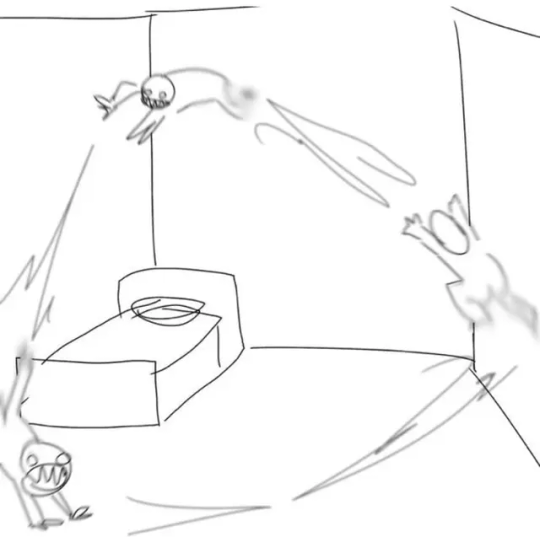


#doctor who#david tennant#i am sosososososo normallllll#literally the piece of media that convinced me that actually i have hyperfixations#literally ruined the end of grade 12 watching it during covid i couldn't stop myself from bingeing 5 episodes in a row like twice daily#even though i saw him in good omens first this is the role that made me absolutely obsessed with david tennant in the first place#he is just soo...#but i can be normal about it i promise i don't think about what devil he sold his soul to be able to make me cry with one line#or the tenth doctor's tragic arc over the course of his three seasons and they way his development is beautifully written#or david's big brown eyes and crooked nose and adorable freckles and spiky fluffy hair#or the two best companions in the whole show who are both so good for him in different but important ways#or poor martha the long-suffering who was betrayed by the writers and the narrative and the doctor and had so much potential#but was victim to the doctor's post-rose angst :(#i don't spend any of the time that i should be working on my academic resoponsiblities thinking about these things no sir#nia originals
15 notes
·
View notes
Text
something about me is that when shakespeare wrote “i burn i pine i perish” he was actually referring to me personally
#shakespeare#taming of the shrew#fun fact i actually played the bianca who that line is said about when i was 16#and the girl who said that line about me (no boys in a shakespeare company duh) i was desperately in love with#and now we are best friends#and she’s doing a semester abroad and im upset!!!!#i am burning and pining and perishing in her absence :(#i am not in love with her anymore but I do have a very intense love for her of the platonic sort#byler#< he could have written it about them too who am i to say#mine
13 notes
·
View notes
Text
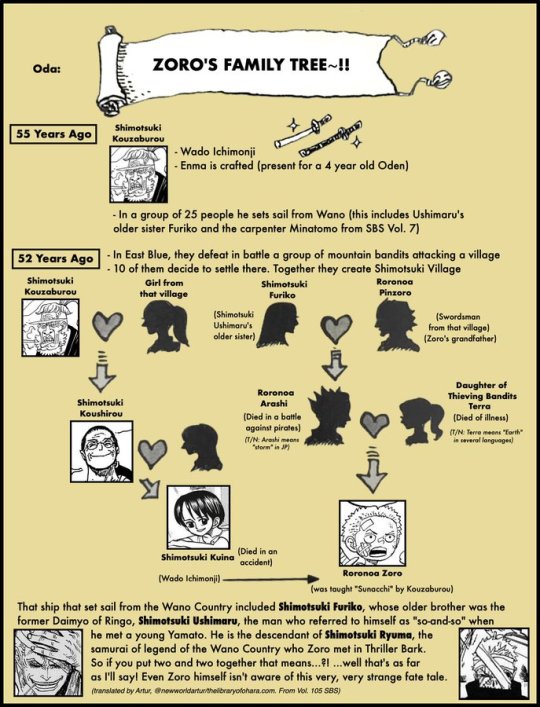
So, I just know all of Tumblr was wondering, "hey, you remember that really weird ZoLaw fan with the annoyingly overly stylized post? I wonder if she's seen this and if she has any theories or thoughts, an observation or two?"
Well, allow me to set your wandering mind at ease, fictional Tumblr fan. The answer is: No. No, I really don't.
I have like three hundred.

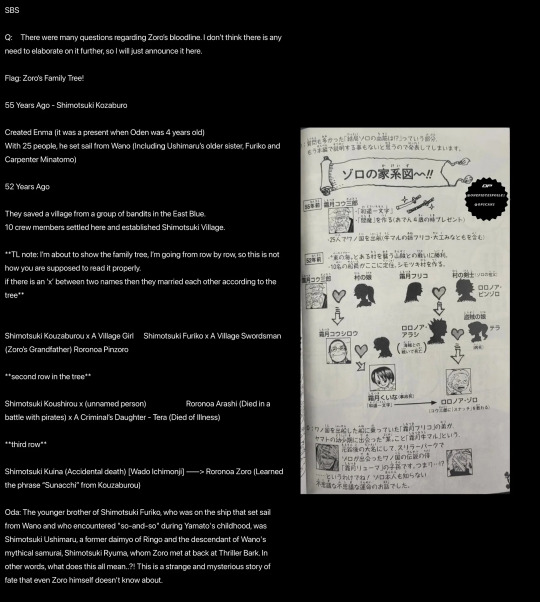
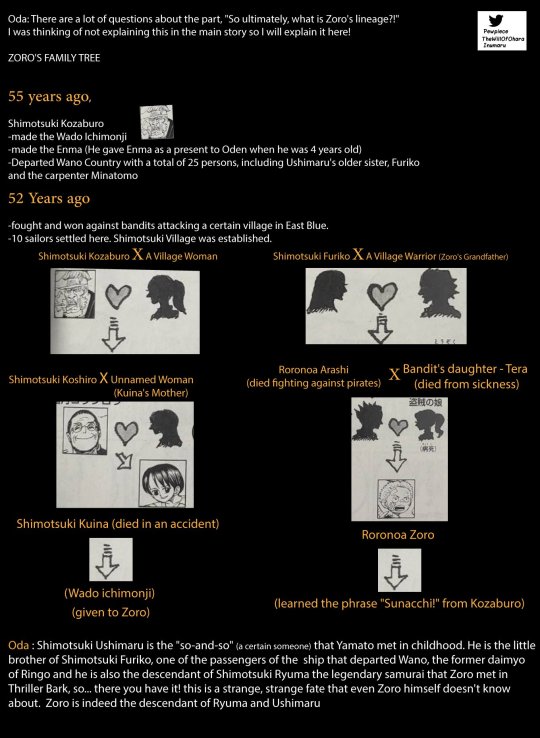
[I also spent time just trying to track down as many translations as possible. Is Tera A Criminal's Daughter or The Daughter Of Thieving Bandits! These are CLEARLY separate things and can ENTIRELY change how her utter nonpresence in Zoro's life shaped him! Though I can take comfort in knowing that, regardless of what kind of crimes her father was committing they were more important than anything his daughter ever did in her entire life.]
And, hey, as might as well jump right into that whole mess.
1. Wait, Zoro's mom is dead? Thank goodness, I was worried Oda forgot one!
(AKA: Stop. Murdering. Moms.)
I'll go first, I don't mind saying when I was wrong. True, in the past I may have suggested that the vast majority of female characters in One Piece come off as ever so slightly, "leaning into sexist tropes with unadulterated joy; it's the misogynistic tropes equivalent of a child running naked through a grocery store. It's right there, everyone sees it, yet people shut up and continue shopping in part because, well, these days you just expect most people to cover that junk! What would you even say? And if you DO speak up and call out the inappropriate, be prepared for blank stares and tantrums; but THEY don't mind! THEY don't think it's wrong! You're just being mean!"
More or less a direct quote.
However, I see now that I rushed to judgement and the reality of the situation is far more nuanced. With that in mind, I was just wondering if someone could help answer some of the questions I have.
Like: Why does Oda believe that it's illegal for (maternal) female characters to survive other character's backstories?
More importantly, why hasn't someone just reached out to explain the misconception!? It can't be that difficult. If nothing else, just have a lawyer or judge or other expert in censorship on hand. Or is the one of those cases where back in highschool his friends made something up and then kept pretending it was real to see if he'd believe you and not only did he fall for it, it took over 20 years before he learned that, what, no that's not illegal. That would be crazy if it were an actual law. Cause you know, after the first 10 years I think yeah you have to just lean into it. Pretend it's a creative decision on your part and definitely not because you were terrified of being sentenced to a slow and humiliating public death.
Just to be clear that's definitely what's up, right? I mean, I'm struggling to think of another reason....able excuse why a story that I really enjoy keeps playing the same old sexist tropes cards again and again to the point of absurdity. It would just help if I had a valid excus- explanation. I almost mistyped the word explanation.
....
....
So I imagine it went like.
"That's the third mangaka they've had to Publically Execute this week!"
"They've started taking this law way more serious lately."
"This one really deserved it though! I heard his main character has a mother in her late forties!"
"That does seem old to have your first child."
"No, he's the middle of three and 22 years old. The story even has flashbacks of defining moments in his childhood and never once did she try to sacrifice herself for him, get murdered by his enemies, or die in meaningless unrelated accidents."
"Damn, that's cold to be there for all the protagonist core moments and not die and help him develop and grow a character? They must have a very antagonistic relationship. Is she actually the villain."
"Not that we know, and when they asked about this being a possible plot twist since - obviously if she's evil no laws are being broken."
"Well, of course, that's the whole reason Statue 2-dash-57 exists; if creators can show they have consistently been building up to a surprise twist then the female character in question can continue to live so long as she continues to be unrepentant and unlikable until the resolution of her arch by the protagonist."
"That's the thing! Under oath not only did man present no evidence to support her identity as a secret villain, he went on the record stating he wanted to depict their relationship as one of a normal modern 20 year old and his mother."
"That can't be true! What publishing company would even print that!?"
"It gets worse. I told you he was a middle child? Well, according to those who've read the actual manga, his younger sister was really sick as a child."
"Oh, well, at least-"
"It was just a fish allergy. She's perfectly fine."
"Sometimes I feel this law is unnecessarily harsh but.... Then you hear stories like that, and you realize that some people really are monsters."
#So this was going to be one post three parts (because obviously) then I remembered even people who have purposefully followed me hate that#I took into consideration that not everyone wants a unmountable wall of Zoro meta analysis on their dash so now its gonna be 3 post style#keeping in mind I've already written it all up and will just be posting them one after the other so effectively the same result#only with the illusion of my empathetic nature#I do have a lot of thoughts on what amounts to a very small amount of scribbled lines and a couple doodles#he literally didn't even bother giving Kuina's mom or grandmothers a name like they didn't even have a identity#In fairness there wasn't a need for them to have any kind of identities or individuality or identifiable features#everyone knows only one trait really matters when it comes to adult females: they go down#into the ground....as a corpse. After ensuring that their death would be the best way to help their children grow. As characters.#I'm joking cuz its funny. It's obvious why Zoro's mom got a name & description: she gave birth to a protagonist and not a human sacrifice#But have considered why those specific qualities are what he chose to define her by - she's fictional he could have made up anything!#I'll have to talk about it in the other posts I'm wasting precious tag room#one piece#roronoa zoro#one piece meta#one piece sexism#this post is not for everyone; actually its pretty much just for me#conversations with fictional people#more opinions than anyone asked for about subjects they don't even care about#Oh! I found the blogs new subtitle!#author gets sassy then preachy then sassy again and then swerves sharply to the weird#oh these tags are way too much#Zoro's backstory#Zoro family history#amusing musings#why am i the way that i am#three post style: part one!
49 notes
·
View notes
Text

i'm glad that you guys are similarly going insane over this line because i went insane writing it
16 notes
·
View notes